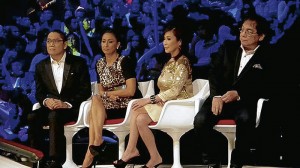On “Protégé” last week, the regional teams of four finalists each displayed varied performing skills, mainly of the musical sort. It was hard to appreciate each finalist’s relative strengths on an individual basis because the group numbers sometimes featured them, especially the better singers, in ways that made them stand out more.
That’s why, when the jurors were asked to pick the strongest bets and then the weakest ones, we sometimes wondered how they could productively do so. In some instances, it was like comparing apples and oranges or apples and pineapples! Who was to say that one finalist’s singing prowess was better than another finalist’s dancing ability?
The situation got so fuzzy at times that jurors hedged and just focused on a finalist’s “total appeal” or “exceptional looks and star quality”—which wasn’t at all that helpful a tack to take, either.
Clearly, the tilt’s competition rounds should pit singer against singer, dancer against dancer, actor against actor, period. That way, more productive and insightful comparisons can be made.
But, wouldn’t that be “unfair” to finalists who are weak in one area, as opposed to the can-do-anything, total-performer types? Well, that’s the way the ball bounces—and the cookie crumbles—and less multitalented bets just have to face up to their limitations.
Pipe dream
Another aspect of the talent tilt that’s beginning to rankle is its notion that talents can be developed and improved significantly within the few weeks that the finalists are being workshopped and mentored. Alas, this is a pipe dream—and a facile fantasy.
Any mentor who “workshops” new talents for the long term knows that real improvement happens very gradually, because the lessons learned have to slowly sink in until they make a tyro performer go from bad to good, from good to better.
In particular, singing and dancing lessons take months, if not years, to transform a performer until he’s good enough to go solo. To think otherwise is to bang your head against a wall that refuses to budge—and all you get is a splitting headache in the attempt.
That’s why we have been suggesting to the people behind TV talent competitions to start their audition and selection process six months or even a full year before their finalists are named.
Nobody needs to know their identities until they have been honed for that long a time to truly become competition-worthy.
That way, once the finalists are named, their level of proficiency would be much higher than what presently obtains on the many “starmaking” competitions we see on the tube.
It would also be wonderful if those tilts stopped trying to create “excitement” and “emotional empathy” by weepily going into each finalist’s “back story,” or by pitting one contestant against another, so viewers can take sides and root for their favored bets.
We know that this is par for the course in local show biz, as exemplified by the Nora-Vilma and other real or concocted stellar “wars,” but this sours up the star-discovery process. Best to focus on talent, looks, quality and charisma, period!


